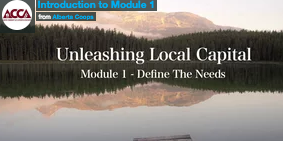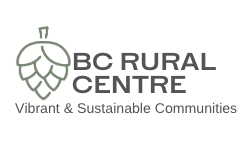
How to create a community investment vehicle
These video modules comes to us courtesy of the Alberta Community & Co-operative Association. Each video provides useful information for rural community leaders interested in raising local capital for community-based investment. While the investment vehicle highlighted here — Opportunity Development Co-operatives — is specific to Alberta, there are lessons and advice here applicable to any jurisdiction.
Module 1: Define The Need
This module looks at some of the theory behind community change. It shows ways to apply visioning and asset-mapping to help overcome factors that keep change from occurring. You will revisit the work that you have completed here as you advance through this guide. As more people get involved in the project you will be drawing on more insights and different experiences. This will lead to a better understanding of the assets and potential investment opportunities in your community. As you talk to more and more people, it is important to revisit your vision. This module helps to stay on track and remind you why you embarked on this adventure.
Module 2: Assemble The Champions
This module addresses the question: Who will lead?
The information and resources provided in this module also help bring together a group of highly-trusted, capable, and motivated people from your community to form a champion team. You will be guided on what skills to look for in individuals, as well as explore different leadership styles, and how to maximize each person’s strengths.
You will also learn on how to frame your conversations to entice interest and gain commitment. In addition to covering what documents need to be established before moving forward, the module touches on naming the Opportunity Development Co-operative.
Module 3: Incorporating Your Opportunity Development Co-operative
This module addresses the questions of “Why a co-operative?” and “How do we set up an Opportunity Development Co-operative (ODC)?”
You will learn how to move forward from an informal group to a legally registered Opportunity Development Co-operative. You will walk through the steps and legal documents required to incorporate this organization. Like other types of corporations, a co-operative has specific rights and responsibilities.
In this module you will learn about co-operative values and principles, the foundation on which co-ops are built. The module also covers co-operative governance, decision-making, and the tax benefits available to ODC’s. Finally, the last section lists and explains the specific documents you’ll need to complete the incorporation process.
This module gives you the technical information you need to incorporate. And you may be tempted to gather the information and head straight to your lawyer. But don’t do that quite yet. If you incorporate prematurely you may have to make some amendments later, costing you time and money.
Module 4: Evaluating Business Opportunities
This module explains how to market your ODC to the business community and get them interested in seeking funding from you. It then discusses how to assess whether the business idea(s) presented to you, or those developed by the co-op itself, warrant investment.
The first section reviews important factors to consider when investing in a local business. The second section examines key questions that the champion team needs to ask before proceeding, and the tools used to evaluate. One of these questions concerns the best type of investment for the business and the investors—debt or equity.
Module 5: The Investment Process
This module explains how you and your team can rally more people to your cause and addresses the question: Who else will help?
You have chosen a promising local business venture. You have figured out the financing required to make it happen. The next step will be the sale of a specific number of shares at a specific price to enable the ODC to meet the financial commitment made to the selected business. Given the local connections of your champion team, you also have an idea (or maybe even a list) of the people to approach with this investment opportunity.
This module explains how to sell shares. It will discuss the tax rules and regulations that are designed to make everyone aware of the risks involved with investing in your ODC and its ventures.
And finally, this module will explain how to complete the investment of the local capital in your chosen business venture.
Module 6: After Care
It is important to learn how to keep your ODC purring along over the long-term. That’s the issue this module is mostly about. Having done all this great work, you will now ask: How do we make it stick?
Lastly, strange as it seems, this is the time to start thinking about the next generation of ODC leaders. Your ODC is a business too. And throughout this guide, you’ve learned about ownership transition and succession planning. Now is the best time to start looking for, talking to, and developing the people who one day will sit in its driver’s seat and take the wheel of this machine you’ve designed and built.
